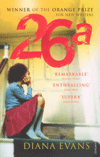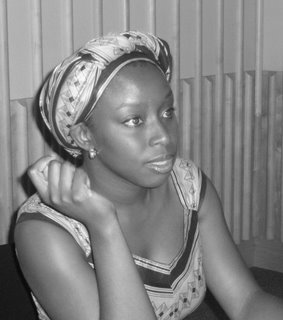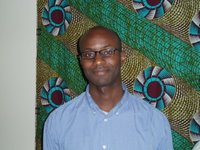The Unbearable Oneness of Being
By Molara Wood
For readers with more than a passing acquaintance with Neasden, North West London, and features such as the scenic lake known as the Welsh Harp, Gladstone Park and the number 297 bus, Diana Evans’ novel,
26a (Chatto & Windus, London; 231 pages) - evokes the familiar.
It is a feat in itself, that Evans manages to paint Neasden as the enchanting setting of her remarkable debut novel about a set of twins. Zadie Smith did something similar with Willesden - just down the road from Neasden - in her debut,
White Teeth. That we have these unlikely locations in notable recent novels, may serve as an indication of new directions in the representation of multiculturalism in current 'British' fiction.
Neasden and Willesden are located in the London Borough of Brent - a local council where whites are now outnumbered by non-whites. Since both authors are females of mixed-race backgrounds, there were bound to be other comparisons, with Evans as the newer writer bearing the burden of having to fight her way out of the shadow of Zadie Smith - a literary superstar. Happily, Evans very quickly put the comparisons largely to rest, with
26a winning prizes and nominations including the first Orange Prize New Writers Award (2005); Smith herself did not get lucky with the Orange until two months ago, with her third novel,
On Beauty. 26a also signals the arrival of a lyrical voice with a wondrous eye on the ways of being in this world.

Evans wrote the book as a way of coping with the death of her real-life twin sister, exploring the terrain of twin-hood, or more specifically, the notion of "twoness in oneness". Latched onto this, is a study of mixed belonging, double reality, psychology and identity, in this devastating novel. The author grew up in Neasden, and readers would be grateful that she resisted the temptation to change her book’s setting. The evocation of place in the novel, the sense of Neasden past and near-present - is such that no one passing in the area after reading the book can fail to take a second look. "Neasden was like the high heel at the bottom of Italy. It was what the city stepped on to be sexy," the narrator observes.
The twins in the book, Georgia and Bessie, are very much a product of their environment, and the setting lends an authentic edge to their experiences. Georgia, the emotionally fragile twin, lives on the edge of reality and is fond of going up to Gladstone House in the local park to chat with the British historical figure after whom the place is named. "The future has already happened," Gladstone tells her, "just like the past… there are no answers, only the places we make." The meetings end abruptly, coinciding (amongst other things) with Georgia’s increasing sense of being lost in the colour-coded abyss of her own mind.
The Hunter family - comprising Nigerian mother Ida, English father Aubrey, the twins and their two sisters - live in 26 Waifer Avenue. But Georgia and Bessie have their own magical realm, and their room in the loft is autonomous, with the door marked ‘26a’ to distinguish it from the rest of the world. This bond precedes the twin’s birth, as they are seen in "a moment of indecision" - as two animals about to be squashed by an approaching vehicle. Georgia carries a scar from that horrific pre-natal accident, and as the novel progresses, the deeper psychological scars begin to show. As the book nears its conclusion, Georgia’s brief, first person narration intrudes, insisting that the bond transcends death.

Ida and Aubrey are in an unhappy marriage and their twin daughters watch the wedding of Prince Charles and Diana on television in 1981, trying to decide whether their parents should get a divorce. Ida had fled her Edo village at night at the age of 15 to escape an early marriage and a dead-end life; Aubrey was running from his past. They met "in the middle", in Lagos. In England, Ida is disturbed by the separation from Nigeria and lives in her memories, conversing with the imaginary presence of her mother, Nne-Nne. As for Aubrey, his fondness for alcohol alters his personality, and turns him into the sinister film character, Mr Hyde - in his family’s eyes.
Evans deftly twins events in
26a, so that later occurrences are mirrored or foreshadowed early on. When the twins’ pet hamster dies, Georgia notes a method to dying, observing that "it was possible… to choose the time, to leave when you were ready." The significance would not be lost on the reader later on. We see the beginning of the royal wedding in the narrative, and we are privy to its end. Georgia begins to consider leaving - the ‘leaving’ would later coincide with the year of Diana’s death.
26a is set partly in Nigeria, and there is a chapter portraying the family’s three-year stay in Lagos. Short at it is, the ‘Nigeria’ segment is quite significant, because nothing afterwards is ever the same again. On a visit to Ida’s hometown of Aruwa, the twins meet their grandfather, Baba - a spinner of ‘true’ tales. His mythical retelling of a story about a set of twins from the superstitious past, would have an inexorable impact on how Georgia and Bessie see themselves. Georgia suffers a sexual assault at the hands of Sedrick the gateman and is unable to confide in her twin sister about the trauma. Meanwhile, the more independent Bessie has inherited Aubrey’s "fascination with movement" and asserts her individuality by travelling to the Caribbean. Georgia is unable to cope as ‘one’ person and loses herself in the terror of ‘red’ danger days.
The sections dealing with Nigeria are among the most beguiling parts of
26a, and are a credit to Evans’ power of recall. She had not been to Nigeria for several years at the time of writing the book, relying instead on memory to help conjure a place from the past. Yet, details of places and people in Nigeria, are delightfully rich; her descriptive style, seamless. The staple food, Eba, is mentioned many times in
26a, without the need for jarring, needless explanations, in stark contrast to, say, Sefi Atta’s approach in her book,
Everything Good Will Come. This is commendable, especially as, of the two writers, Evans most probably spent less time in the Nigerian environment.
Diana Evans tells a poignant tale in
26a, taking the age-old myth of twins in new, unexpected directions. In the unfolding tragedy, the novel contrives an embrace for Ida and Aubrey, a couple that has long forgotten the art of tenderness. In so doing, those who survive are offered the chance perhaps to heal - and start again.












